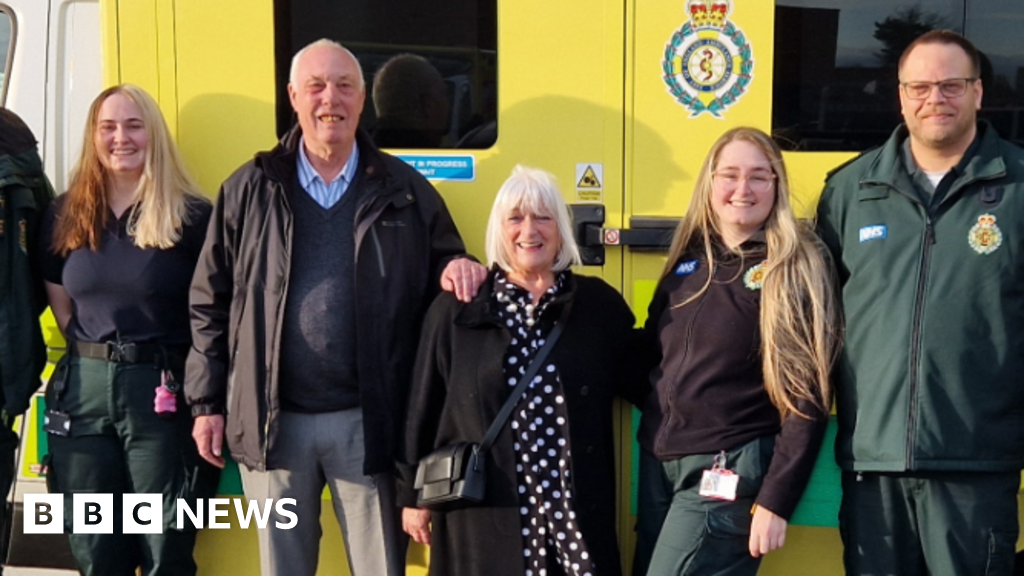 Image source, PACEMAKER
Image source, PACEMAKER
Health service workers have walked out in recent months in a dispute over pay
Health workers in Northern Ireland have been left with a "de facto pay freeze", the six health trust chief executives have said.
They made the claim in a letter to Northern Ireland Secretary Chris Heaton-Harris on Tuesday.
Northern Ireland health and social care staff remain the lowest paid in the UK and are yet to be offered a pay uplift for 2023-24.
Unions representing workers said they welcomed the "direct intervention".
Responding to the letter, a spokesperson for the Northern Ireland Office said the UK government did not have any authority to negotiate pay and the Department of Health made the final decisions.
The ongoing pay dispute has led to health workers striking over pay in recent months.
In the letter, the chief executives said they care deeply about their workforce, and want to see "concrete action" on suitable pay awards.
They said their work during the Covid-19 pandemic and severe pressures on services were "taking a toll" on staff.
"It is unsustainable and unfair that they should be left with a de facto pay freeze during a cost of living crisis," the letter said.
Health care staff in Northern Ireland received a below-inflation pay award for 2022-23.
NHS workers in England received a 5% increase in 2022-23 and a one-payment of at least £1,655.
Image source, Liam McBurney/PA Media
Image caption,Workers from nurses to physiotherapists have walked out in a call for pay parity with other NHS workers
The letter stated that the Department of Health explained it was not "currently feasible" for it to match the current pay offers given to English workers.
The chiefs recognised that this has left the department with an "impossible decision".
History repeating itself
The chief executives also pointed to industrial action taken by health care staff in 2019 over pay.
It was the first time members of the Royal College of Nursing (RCN) voted to go on strike anywhere in the UK in its 103-year history.
The letter said the dispute was only resolved with the re-establishment of pay parity with England.
"It is hugely frustrating to see history repeating itself within four years," they added.
Without a pay award in place, further industrial action has been planned which will "impact heavily on an already fragile health and care system" during the most challenging time of the years.
Image source, MARK MARLOW/EPA-EFE/REX/Shutterstock
Image caption,The chiefs have asked Chris Heaton-Harris to take "concrete action" to stop further disruption
"Reducing our unacceptably long waiting lists will require not just investment but a sustained focus on productivity," they said.
"Whilst we are committed to making that happen, progress becomes immeasurably more difficult with a demoralised and depleted workforce and sustained period of industrial action.
"This cannot be a subsidiary issue to the work being done to restore the NI Assembly, as important as that may be."
Unions welcome letter
Kevin McAdam, Unite's lead officer for health, said the unions welcomed the letter, describing it as an "important intervention", but it had come a little bit too late.
"Their staff have been on strike, some of them for five days in the last year," he told BBC News NI.
"I think it's bringing to the secretary of state in very real terms how fragile the health service is and how dependent on staff the health service is."
Mr McAdam said further industrial action before the end of the year is not out of the question.
"We want to be in there helping people, fixing people, treating people but we can't do that on nothing," he added.
"We're caught between a rock and a hard place and we will be planning further action before Christmas."
A joint letter from the unions representing healthcare workers said it was "not before time" the chiefs accepted their responsibilities as employers of the 60,000 healthcare staff in Northern Ireland.
"Health workers cannot go on with the current financial hardships being faced by the lack of a pay offer," a joint letter said.
Image source, Claudia Savage/PA Media
Image caption,Union members held a demonstration outside Belfast City Hall as a 48-hour strike came to an end last month
"Trade Unions wholly agree, and have stated repeatedly, that the resolution of this dispute must not be subsidiary to any resolution of political stalemate here."
'Unfair and shameful'
Rita Devlin, NI director of the RCN, said it was "deeply unfair and shameful" that Northern Ireland healthcare staff were the lowest paid in the UK.
"Our staff won pay parity in 2020 and were assured by all political parties that it wouldn't happen again," she tweeted.
A spokesperson for the NIO said: "Sustainable public finances are critical to pave the way for long awaited improvement and transformation of the public services that we all rely on and want to protect."
The statement added the government's top priority was to restore the Executive so elected representatives could make "fundamental decisions on Northern Ireland's public services and deliver better outcomes for the people of Northern Ireland".
 (1).png)
 1 year ago
20
1 year ago
20













